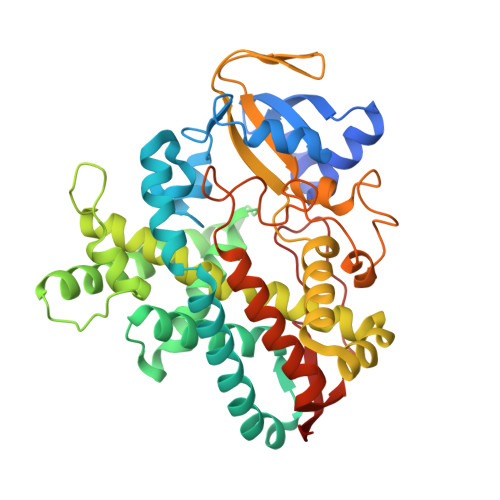Biocatalytic Enantioselective beta-Hydroxylation of Unactivated C-H Bonds in Aliphatic Carboxylic Acids.
Zhang, K., Yu, A., Chu, X., Li, F., Liu, J., Liu, L., Bai, W.J., He, C., Wang, X.(2022) Angew Chem Int Ed Engl 61: e202204290-e202204290
- PubMed: 35536725
- DOI: https://doi.org/10.1002/anie.202204290
- Primary Citation of Related Structures:
7WYG - PubMed Abstract:
Catalytic selective hydroxylation of unactivated aliphatic (sp 3 ) C-H bonds without a directing group represents a formidable task for synthetic chemists. Through directed evolution of P450 BSβ hydroxylase, we realize oxyfunctionalization of unactivated C-H bonds in a broad spectrum of aliphatic carboxylic acids with varied chain lengths, functional groups and (hetero-)aromatic moieties in a highly chemo-, regio- and enantioselective fashion (>30 examples, Cβ/Cα>20 : 1, >99 % ee). The X-ray structure of the evolved variant, P450 BSβ -L78I/Q85H/G290I, in complex with palmitic acid well rationalizes the experimentally observed regio- and enantioselectivity, and also reveals a reduced catalytic pocket volume that accounts for the increased reactivity with smaller substrates. This work showcases the potential of employing a biocatalyst to enable a chemical transformation that is particularly challenging by chemical methods.
Organizational Affiliation:
College of Bioscience and Biotechnology, Yangzhou University, Yangzhou, Jiangsu, 225009, China.


















